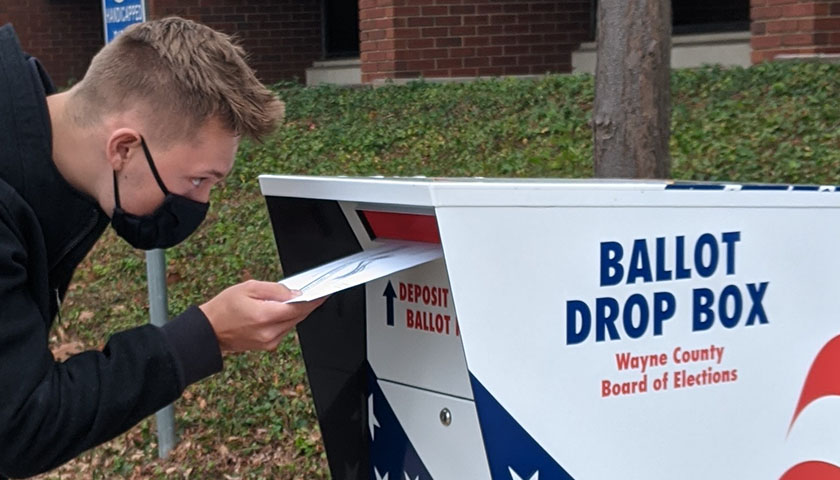by Natalia Mittelstadt
The Center for Tech and Civic Life (CTCL) is pouring new election grant funding into rural areas in 20 states, after “Zuckerbucks” in the 2020 election sparked backlash across the country.
Following the private funding of election administration during the 2020 presidential election, most states cracked down on it by enacting laws to prevent such funding in future elections. However, many states still allow it, and CTCL is focusing on granting funds to election offices in rural counties throughout the 2024 presidential election cycle.
CTCL announced its 2024 Rural and Nonmetro Election Infrastructure Grant Program on Friday, which makes $2.5 million of grant funding available to 20 states.
The grant applications opened on Aug. 2 for the U.S. territories and the following states: Alaska, California, Colorado, Connecticut, Delaware, Hawaii, Illinois, Maine, Maryland, Massachusetts, Michigan, Minnesota, Nevada, New Hampshire, New Mexico, New York, Oregon, Vermont, Washington, and Wyoming.
Tiana Epps-Johnson, founder and executive director of CTCL, said in a statement released Friday, “Unfortunately, local election departments remain severely underfunded after Congress cut Help America Vote Act funding last year to just $55 million nationwide, which means most rural election offices don’t get regular funding from the federal government,” she said.
“This program will help eligible rural and nonmetro election offices modernize outdated voting technology, improve access to voting for rural voters, seniors, and veterans, and make much-needed infrastructure updates to enhance election security and make voting smoother for everyone,” Epps-Johnson added.
CTCL didn’t immediately respond to a request for comment on Monday.
The grant funds are to be used for election administration between July 31 and Dec. 31, 2024, according to CTCL’s website.
County election offices eligible for the grants are those that are defined as “rural” and “nonmetro” based on the U.S. Department of Agriculture’s 2023 Rural-Urban Continuum Codes. The populations of “rural” and “nonmetro” counties range from 20,000 or more to fewer than 5,000. Metro counties start at population sizes of fewer than 250,000.
CTCL uses the U.S. Census Bureau’s 2022 Citizen Voting Age Population and the Stewards of Democracy research by the Democracy Fund to determine how much funding to give jurisdictions based on their populations.
According to the tiered funding categories based on citizen voting age populations, counties with 5,000 or fewer U.S. adults can apply for a $5,000 grant, those with the population range of 5,001 to 25,000 can get $20,000, while counties with 25,001 to 100,000 can receive $50,000, and populations ranging from 100,001 to 250,000 can apply for a $100,000 grant.
According to CTCL, the funding can be used for “key human, physical, and technological assets that the U.S. Department of Homeland Security has identified as necessary to conduct elections.” These assets include voting locations, technical facilities, storage facilities, processing facilities, administrative facilities, voting hardware, IT systems, and personnel.
The grant funding is not the result of donations from the Chan Zuckerberg Initiative this year, unlike in 2020, according to CTCL’s website.
CTCL poured about $350 million into local elections offices managing the 2020 election, with most of the funds donated to the nonprofit by Facebook founder Mark Zuckerberg. The nonprofit has claimed its 2020 election grants — colloquially known as “Zuckerbucks” — were allocated, allegedly without partisan preference to make voting safer amid the pandemic.
However, a House Republican investigation found that less than 1% of the funds were spent on personal protective equipment. Most of the funds were focused on get-out-the-vote efforts and registrations.
While CTCL claims that more grants were awarded to counties won by former President Donald Trump than President Joe Biden, the nonprofit gave larger grants and more money per capita to Democratic counties than to Republican ones. Trump won more than five times as many counties as Biden in 2020.
Amid controversy surrounding the disproportionate resources funneled to Democratic jurisdictions and claims the imbalance helped sway the election in Biden’s favor, 28 states have either restricted or banned private funding of election offices, according to Capital Research Center.
In 2022, CTCL created a new project, called the U.S. Alliance for Election Excellence, which localities can join as members. The alliance awards funds to counties and municipalities under the Centers for Election Excellence program. The alliance will provide $80 million over five years “to envision, support, and celebrate excellence in U.S. election administration,” according to CTCL.
Four counties – two in North Carolina and two in Utah – have both withdrawn from the U.S. Alliance for Election Excellence since last year. Some of the counties’ election officials cited membership cost or time commitment as their reasons for leaving.
In May, the U.S. House Ways and Means Committee passed the End Zuckerbucks Act, a bill introduced by Rep. Claudia Tenney, R-N.Y., that would amend the IRS code to prevent 501(c)(3) nonprofit organizations from indirectly or directly providing funding for election administration.
In March, Indiana enacted a law that would ban “Zuckerbucks 2.0,” which is what the U.S. Alliance for Election Excellence has been called by critics.
– – –
Natalia Mittelstadt is a reporter at Just the News. Photo “First time voter” by Karri VanKirk CC BY-NC 2.0.





